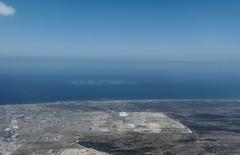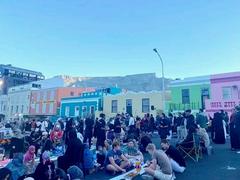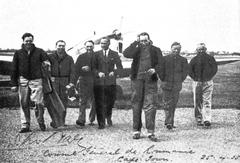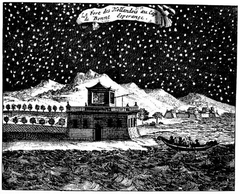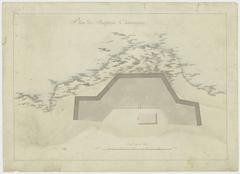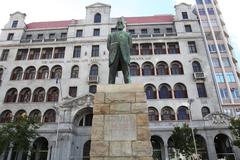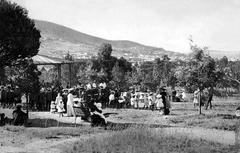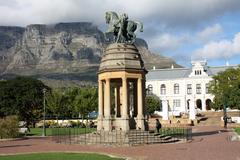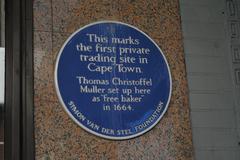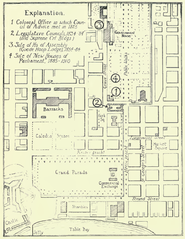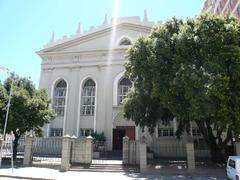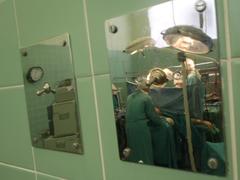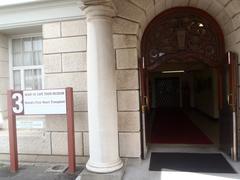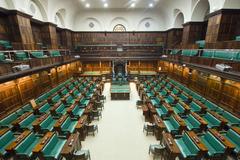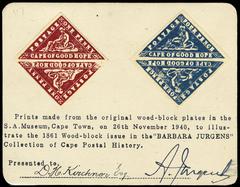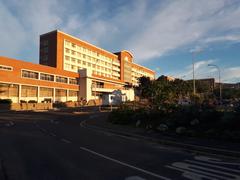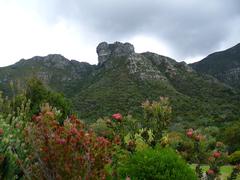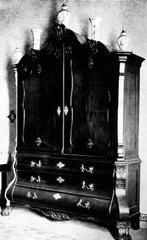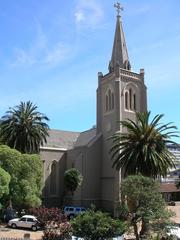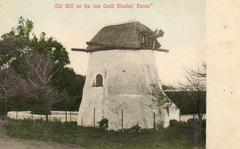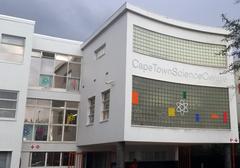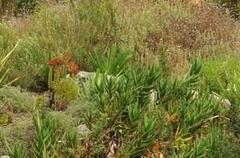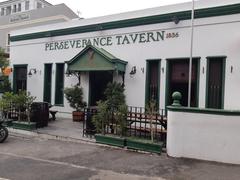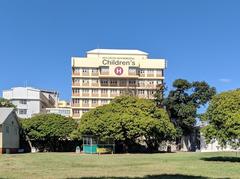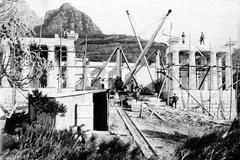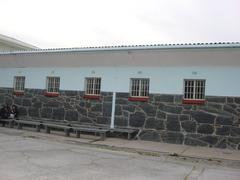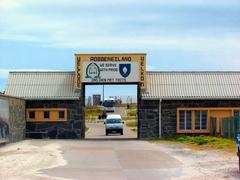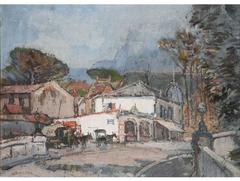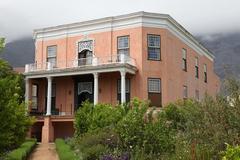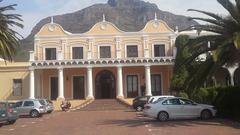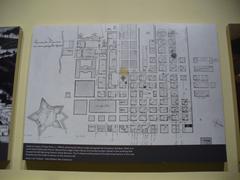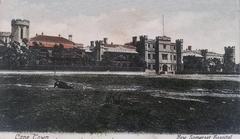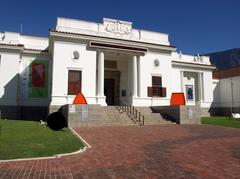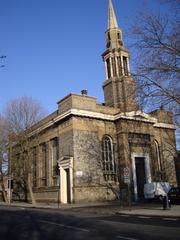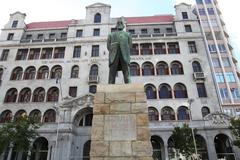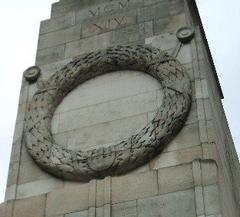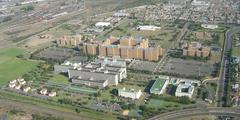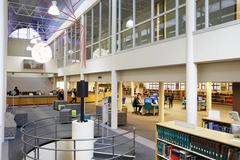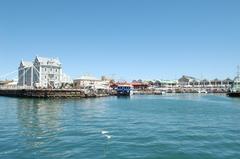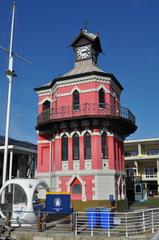Cape Town Holocaust and Genocide Centre: Visiting Hours, Tickets, and Travel Guide
Date: 14/06/2025
Introduction
The Cape Town Holocaust & Genocide Centre (CTHGC) stands as South Africa’s first institution dedicated to Holocaust and genocide education. Established in 1999 during the country’s transition from apartheid to democracy, the Centre is a crucial site for remembrance, education, and social justice. Its mission is to confront the horrors of the Holocaust and other genocides, promote human rights, and challenge prejudice, racism, and xenophobia both in South Africa and globally. This comprehensive guide provides essential and up-to-date information about visiting hours, ticketing, exhibitions, accessibility, educational programs, and nearby historical attractions—ensuring a meaningful and accessible visit for locals, tourists, educators, and human rights advocates alike (Cape Town Holocaust Centre, Lonely Planet).
Table of Contents
- Introduction
- Historical Background and Significance
- Visiting Information: Location, Hours, Tickets, and Accessibility
- Exhibitions and Educational Programs
- Visitor Experience and Travel Tips
- Facilities, Guidelines, and Accessibility
- Nearby Attractions
- Frequently Asked Questions (FAQ)
- Conclusion
- References
Historical Background and Significance
Founding Vision and Development
The CTHGC was founded in 1999, at a critical juncture in South Africa’s history as it emerged from apartheid. Inspired by the “Anne Frank in the World” exhibition and modeled on international Holocaust memorials, the Centre’s establishment was driven by local leaders such as Myra Osrin. Its mission is to educate the public about the Holocaust and subsequent genocides, while fostering critical engagement with South Africa’s history of discrimination and its ongoing social challenges (Cape Town Etc).
Educational Impact and National Relevance
Since 2007, Holocaust education has been part of the South African school curriculum. The CTHGC has welcomed over 260,000 visitors and trained thousands of teachers, becoming the country’s only accredited in-service Holocaust education provider. Its programs reach a wide audience, including students, educators, police, military personnel, and community leaders. Survivor testimonies, interactive exhibitions, and partnerships with organizations such as the USC Shoah Foundation enrich its resources (Wikipedia).
Contemporary Relevance
The Centre’s work extends beyond the Holocaust, addressing other genocides like Rwanda and Cambodia, and drawing parallels to apartheid-era South Africa. By connecting past atrocities to current issues of prejudice and disinformation, the CTHGC underscores the universal importance of remembrance and human rights.
Visiting Information: Location, Hours, Tickets, and Accessibility
Location
- Address: 88 Hatfield Street, Gardens, Cape Town, South Africa (Lonely Planet)
- The Centre is situated on the city’s Museum Mile, adjacent to the South African Jewish Museum and the Great Synagogue. The area is accessible by MyCiTi bus, local taxis, and is within walking distance from central Cape Town hotels and attractions. Limited street parking is available; early arrival is recommended.
Visiting Hours (as of June 2025)
- Monday to Thursday: 10:00 – 17:00
- Friday: 10:00 – 14:00
- Closed: Saturdays, Jewish holidays, and certain public holidays
- For the latest visiting hours, consult the official website.
Admission and Tickets
- Entry: Free for all visitors; donations are encouraged to support the Centre’s programs (Traces of War)
- Guided Tours: Free tours are available in English (other languages by prior arrangement). Booking is recommended for groups and school visits (CTHGC website).
Accessibility
- Fully wheelchair accessible: step-free entrances, ramps, elevators, and accessible restrooms.
- Resources for visitors with visual or hearing impairments are available upon request; please give advance notice.
- Parking spaces reserved for visitors with disabilities.
Exhibitions and Educational Programs
Permanent Exhibition
The Centre’s permanent exhibition explores the Holocaust, anti-Semitism, and genocide, with a particular focus on South Africa’s context. Visitors are guided through the roots and rise of anti-Semitism in Europe, the events of the Holocaust (1933–1945), the aftermath and legacy, and connections to other genocides and apartheid (Cape Town Direct). Features include:
- Text and photo panels, archival documents, and original artefacts
- Multimedia installations and survivor testimonies
- Dedicated sections on Cape Town-based survivors
- Recreated environments for immersive learning
- Reflections on the links between the Holocaust, apartheid, and contemporary human rights (Cape Town Etc)
Temporary and Special Exhibitions
Regularly updated, these exhibitions cover topics such as:
- “Echoes of (Post)Memory: A Journey Through Jewish Poland” (July 2025)
- Anne Frank exhibitions and other international traveling displays
- Book launches, lectures, and commemorative events (CTHGC Events)
Educational Programs
- School Group Programs: Structured workshops for Grades 9–12; links Holocaust history to apartheid and human rights.
- Teacher Training: Accredited in-service workshops, including the Residential Educator Training Programme.
- Community Education: Programs for adults, professionals, and marginalized communities.
- Public Events: Lectures, film screenings, and commemorative ceremonies (Cape Jewish Chronicle).
Virtual tours and online educational resources are available on the Centre’s website.
Visitor Experience and Travel Tips
- Duration: Allocate 1.5 to 2.5 hours for your visit; plan extra time for guided tours or events.
- Reflective Spaces: The exhibition concludes with space for reflection, including a quote from Archbishop Desmond Tutu (Tamlyn Amber Wanderlust).
- Bookshop: Educational materials, books, and souvenirs are available on-site.
- No café: Several cafés and restaurants are within walking distance.
Travel Tips:
- Arrive early to avoid crowds, particularly during school terms or special events.
- Bring a valid photo ID for entry into the secure compound.
- Dress modestly out of respect for the Centre’s commemorative purpose.
- Prepare emotionally for challenging content—staff are available for support.
Facilities, Guidelines, and Accessibility
- Wheelchair access throughout, including restrooms and parking.
- Seating is available across exhibition spaces.
- Photography: Allowed in designated areas only; check with staff for guidance.
- Children: Welcome, but content may be distressing for younger visitors; children under 12 should be accompanied by an adult.
- Quiet environment: Please speak softly and behave respectfully.
Nearby Attractions
Make the most of your visit by exploring:
- South African Jewish Museum: Jewish life in South Africa and the diaspora.
- Great Synagogue: Historic synagogue with volunteer guides.
- South African Museum and Planetarium: Natural history and astronomy exhibits.
- South African National Gallery: South African and international art collections.
- District Six Museum: Focus on forced removals during apartheid (Lonely Planet).
Frequently Asked Questions (FAQ)
Q: What are the current visiting hours?
A: Monday to Thursday, 10:00–17:00; Friday, 10:00–14:00. Closed on Saturdays, Jewish holidays, and some public holidays.
Q: Is there an admission fee or do I need tickets?
A: Admission is free; no tickets are required. Donations are appreciated.
Q: Are guided tours available?
A: Yes, free guided tours are offered in English; other languages are available by prior arrangement.
Q: Is the Centre wheelchair accessible?
A: Yes, with ramps, elevators, and accessible restrooms.
Q: Can children visit?
A: Yes, but the content is sensitive; children under 12 must be accompanied by an adult.
Q: Are virtual tours offered?
A: Yes, available via the official website.
Conclusion
The Cape Town Holocaust & Genocide Centre is a vital educational and commemorative institution, offering visitors a profound journey through history’s darkest chapters and their relevance to contemporary society. Its accessible, thoughtfully curated exhibitions and diverse educational programs make it a must-visit for anyone seeking to understand the enduring impact of prejudice and the importance of human rights. By visiting and supporting the Centre, you help uphold its mission of remembrance, education, and the promotion of justice and compassion.
References and Further Reading
- Cape Town Holocaust & Genocide Centre official website
- Lonely Planet: Cape Town Holocaust Centre
- Cape Town Etc: Celebrating 25 years of the Cape Town Holocaust Centre
- Traces of War: Holocaust & Genocide Centre Cape Town
- Cape Jewish Chronicle
- Tamlyn Amber Wanderlust
- Wikipedia: Cape Town Holocaust Centre
- Cape Town Direct
For updates on visiting hours, exhibitions, and educational programs, follow the Centre on social media and consider downloading the Audiala app for guided audio tours and enhanced visitor experiences.
